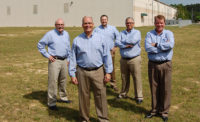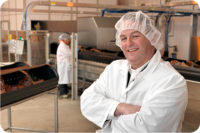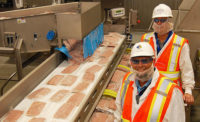Little did Jacobson know, however, that less than two years later, the sister company created from that first HPP machine — Universal Pasteurization Co. (UPC) — would be receiving its fourth and fifth presses, and building the infrastructure to house more.
“[HPP is] coming to the forefront as a food-safety intervention, and we have enough resources that we can grow to seven or more presses,” Jacobson explains, “which probably would make us the largest commercial application of HPP in the world.”
Early, speedy growth
Jacobson and his team have never been afraid to commit funding and effort to improving their business. UCS purchased its current facility — a former grocer distributor — in 2004 and immediately replaced 11,000 single-rack freezer slots with push-back racking, giving the company far fewer unnecessary aisles (down to two aisles from six) and far more storage volume.
Then, the additions began — first, UCS added 8,000 freezer positions by restructuring the west wing of the building, and added 16,000 slots in a new freezer that came online in December 2009. The facility now holds 37,000 cold-storage positions in total.
At the time of UCS’ purchase, Jacobson says, the facility featured 100,000 square feet of ambient floorspace, giving the company plenty of room to temper or slack out product. He adds that it was great timing for the company to add these services, given economic conditions.
“Larger companies that need to increase their production have re-analyzed what they’re doing themselves, and in many, many cases, they’ve outsourced some of the relabeling, pricing, leaker checks — any number of final activities — before the product goes to the customer,” Jacobson explains. “They’ve found it’s more economical, especially within a reasonable driving distance to Lincoln, to outsource those activities, take that gained space, and put in additional kilns or smokers or whatever it is that will make them far more money than housing the value-added services we provide.”
Those services include everything from pack-off to dry-aging of beef, water-tempering, air-tempering, pre-pricing, code-dating and some netting of product. Furthermore, a third, separate company operates out of UCS’ facility, and that company is Universal Transit — a transportation company that operates 16 tractors and 74 trailers, and works closely with the Universal group, explains Jeff Barnard, business manager for UCS and UPC.
“We can utilize them to pick up the product and bring it here,” he says, “and they also offer service for LTL shipments and shipments out of the facility too, which gives us one more value-added to help us fill the niche we’re seeking to fill.
“It gets us what we like to call ‘supercenter status,’ where with one phone call, our customers can get everything done,” Barnard adds. Curt Roberts, director of operations for UCS and UPC, says his team can tap in to the data on each truck, giving them excellent visibility through the distribution process, working seamlessly with the company’s state-of-the-art warehouse management system.
“There are three major customers that we’ve landed because of the relationship with Universal Transit,” Roberts explains. “When they realized that they didn’t have to contract with an LTL carrier, and basically with one phone call they could arrange not only their storage but their transportation as well, it was huge for them.”
Added value meets technology trends
As previously mentioned, the idea of offering high-pressure pasteurization (HPP) services came to UCS in 2010 from a customer.
“It originated through one telephone call [from a local customer],” Jacobson recounts. “He said they were sending about 125,000 pounds a week to an HPP facility that was some distance from Lincoln and [were looking for more local alternatives].”
Jacobson asked the customer to give him two to three days to investigate, and Roberts took on the task of investigating the technology.
“I think it only took us about three days to decide to enter the new era, so to speak,” Jacobson adds. With a 90-day window to get up and running, UPC got a huge assist from its HPP equipment supplier, and got its first press online Dec. 31, 2010.
“Then the truckloads started coming, and that began the life of the first press,” Jacobson says. UPC then contacted one other in-house customer whose facility was 45 miles from Lincoln, and who had asked about HPP before.
“It was a natural for them to change their HPP provider and put it all here,” he says. As summer 2011 wore on, word got out that UPC had two machines and interest grew. A “really large contract with a national company” then forced UPC to order a third HPP machine, which arrived and was online before the close of 2011. And, in March, UPC received its fourth press, which arrived at the time of The National Provisioner’s visit to the company.
With this explosive growth, however, the question that has been paramount to the business is the speed at which UPC can accept new contracts and add machines in a timely fashion.
“It’s a classic chicken-and-egg scenario, because some of these companies will work for months or years deciding to pull the trigger on a product,” he explains. “Then they’ll come to us, and the last thing we want to say to them is, ‘Well, it’ll take us about six months before we can do it,’ because that’s not the kind of answer they want to hear. So we have done a lot of rushing [to keep up with demand].”
To meet this demand, UPC has gotten major assistance from its equipment supplier and, recently, from the USDA. To that point, Dec. 16, 2011, was a milestone date for UPC, as it secured second-shift coverage from the USDA.
“It was frustrating to have so much work to do, but at 6 o’clock in the evening, we had to shut them off and turn the lights out,” he says. “But USDA really stepped up — the application period and granting of the second shift was expedited.”
Since then, UPC has been running two 10-hour shifts, seven days a week, but for the sake of his workforce, the machines and scheduling, the company’s goal is to move away from production on Sundays. According to Jacobson, the company views HPP machines in the same way the military treats machine guns and infantry.
“Those that have been in the infantry were always taught to deploy machine guns in pairs, and we subscribe to the theory that you need to deploy HPP machines in pairs, because they’re highly technical and somewhat prone to needing rather high levels of care and preventive maintenance.
“They’re not designed — nor should they be designed — to run 24 hours a day, seven days a week without some hiccups,” he says.
Innovation, growth on tap
Fast growth has been the norm at Universal, with the cold storage business growing at about 25 percent a year in gross sales. HPP has propelled itself exponentially, going from a $30,000-a-week business one year ago to $200,000 a week at presstime.
As the foundation for growth is laid and becomes more stable, Jacobson says the sister companies won’t ignore future value-added opportunities. In fact, he admits that Universal has discussed over the first few months of 2012 additional expansion.
“It would probably be a little bit more multidimensional of a space instead of just going to straight freezer,” he explains. “We would set up some more specialty rooms where we could keep one specific activity isolated to just one area.”
Universal has 75,000 square feet of open space on the east side of the building and room to the south as well, and Jacobson is thankful for that additional space. Yet he knows they will have to be innovative about how the new portions of the facility are plotted out to best serve the customers.
“We handle, in the course of a year, tens of millions of pounds of product, which comes in, receives some type of value-added service, either goes back to the customer for further-processing or goes to the customer’s final retail outlet,” Jacobson concludes.
The only limit to increasing that production revolves around how quickly the Universal team can develop and install services that meet demand, particularly as value-added offerings such as HPP continue to skyrocket in popularity among processors.











Report Abusive Comment